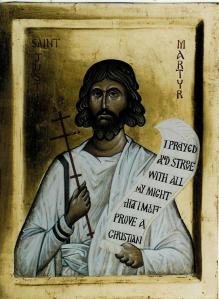 |
| Justin Martyr |
The distinctive feature of this Word is its relation through the Spirit to historical facts and events. It is when we allow the Scriptures to direct us to these facts and events that our minds fall under the power of their truth and we are compelled to believe for they carry in themselves their own demonstration. This is not, of course, any kind of logical proof, but the kind of demonstration that arises immediately out of the facts and events themselves through their self-evidence. This is particularly well expressed in a fragment of a lost work on the resurrection that has survived through John of Damascus and attributed to Justin.
[T]he Word of truth is free, and carries
its own authority, disdaining to fall under any skilful argument, or to
endure the logical scrutiny for its hearers. But it would be believed of
its own sake, and for the confidence due to him who sends it. Now the
Word of truth is sent from God, wherefore the freedom claimed by the
truth is not arrogant. For being sent with authority, it were not fit
that it should be required to produce proof of what is said, since
neither is there any proof beyond itself, which is God. For every proof
is more powerful and trustworthy than that which it proves, since what
is disbelieved, until proof is produced, gets credit when such proof is
produced, and is recognised as being what it was stated to be. But
nothing is more powerful or more trustworthy than the truth; so that he
who requires proof of this, is like one who wishes it demonstrated why
the things that appear to the senses do appear. For the test of those
things which are received through the reason, is sense; but of sense
itself there is not test beyond itself. As then we bring those things
which reason hunts after, to sense, and by it judge what kind of things
they are, whether the things spoken be true or false, and then sit in
judgment no longer, giving full credit to its decision; so also we refer
all that is said regarding men and the world to the truth, and by it
judge whether it be worthless or no. But the utterances of truth we
judge by no separate test, giving full credit to itself. And God, the
Father of the universe, who is the perfect intelligence, is the Truth.
And the Word, being his Son, came to us, having put on flesh revealing
both himself and the Father, giving to us in himself resurrection from
the dead and eternal life afterwards. And this is Jesus Christ our
Saviour and Lord. He, therefore, is himself both the faith and the proof
of himself and of all things. [Thomas F. Torrance, Divine Meaning, 95-6; the quote from Justin, De resurrectione, 1.1f, from the Sacra Parallela of John of Damascus. E.T. from Ante Nicene Christian Library, vol. 2, pp. 341ff. This is not generally accepted as Justin's
own work, but like the Cohortatio ad Graecos was at least written under his influence.]

Bobby,
ReplyDeleteWhat is the best book you can recomend me to begin
reading torrance?
His, The Mediation of Christ, or his Incarnation.
DeleteThat was absolutely wonderful, Justin just earned another point in my book.
ReplyDelete:-)
Delete